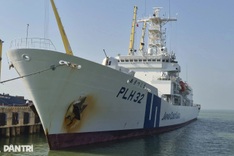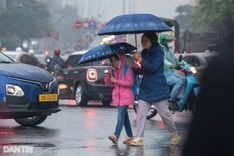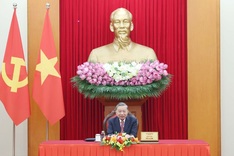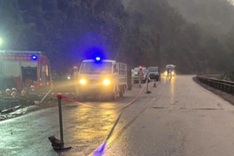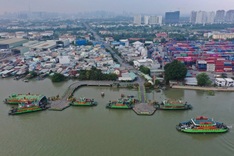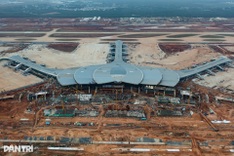US President Barack Obama will urge world leaders to harden their resolve to lock down nuclear material on the second day of a summit Tuesday aimed at keeping atomic weapons out of terrorist hands.
Obama organized the 47-nation summit in Washington, the biggest hosted by a US leader since 1945, with the aim of securing loose materials in military and civilian stockpiles worldwide within four years.
The two-day gathering saw Obama meet Monday with Chinese President Hu Jintao and others in consultations he described as "impressive."
"I think it's an indication of how deeply concerned everybody should be with the possibilities of nuclear traffic," Obama told reporters.
"I think at the end of this we're going to see some very specific, concrete actions that each nation is taking that will make the world a little bit safer."
Ex-Soviet republic Ukraine, site of the horrific 1986 Chernobyl nuclear power plant explosion, gave early impetus to the summit on Monday by renouncing its bomb-grade uranium.
Newly inaugurated President Viktor Yanukovych told Obama in a bilateral meeting that he would give up 90 kilos (180 pounds) of Ukraine's highly enriched uranium, the equivalent of several bombs, the White House said.
But Obama's top terrorism advisor John Brennan warned that Al-Qaeda's interest in nuclear weapons was "strong" and said the risk of nuclear terrorism was "real," "serious" and "growing."
Leaders from China, France, India, Pakistan, Russia and dozens of other countries converged on a heavily guarded conference center for the two-day meeting.
The goal is to make sure that worldwide stocks of separated plutonium and enriched uranium are destroyed or accounted for and therefore unable to fall into the hands of militant groups.
Following Ukraine's pledge, Canada made a similar promise on its own smaller stockpile, as had Chile earlier.
President Sebastian Pinera said that Chile's shipment of highly-enriched uranium to the United States served as "an example of how a smaller country can contribute concrete actions for a safer world."
On Tuesday, the United States and Russia were also to sign an accord on tidying up plutonium reserves. The deal spells out elimination of the countries' excess plutonium stores -- enough "for several thousand nuclear weapons," according to the State Department.
Ahead of the summit Obama branded attempts by non-state groups to obtain nuclear devices "the biggest threat to US security, both short-term, medium-term and long-term."
"This is something that could change the security landscape of this country and around the world for years to come," Obama said Sunday.
French President Nicolas Sarkozy agreed that keeping fissile material out of the hands of extremist groups was vital, but said he could not abandon his own nation's nuclear weapons program "on a unilateral basis, in a world as dangerous as the one in which we live today." Related article: 'I will not give up nuclear weapons', says French president
"I have inherited the legacy of the efforts made by my predecessors to build up France as a nuclear power. And I could not give up nuclear weapons if I wasn't sure the world was a stable and safe place," Sarkozy told CBS News in Washington.
Leaders at summit work on halting nuclear traffic
US President Barack Obama will urge world leaders to harden their resolve to lock down nuclear material on the second day of a summit Tuesday aimed at keeping atomic weapons out of terrorist hands.
Source: AFP


